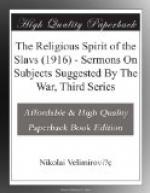This was likewise the great result of the religious revolutions among the Slavs: not to shake the realities but the illusions of religion. Pride, superstitions and hatred have produced all the revolutions in the Church, the revolutions which meant for the Church real ventilation or punishment. These revolutions gave light and air to the Roman Church. Either the official books admit it, or they do not. No matter; the living Church admits it. She has built monuments to the prophets whom she killed or persecuted. No one is without a glorious monument—neither Huss nor Savonarola, neither Bruno nor Hieronymus of Prague, neither Trubar nor Strossmayer. The living Church always admired men of suffering and not men of pleasure. It was not the self-sufficient prelates who promoted the Christian cause, with their books and notes and discussions, but the sufferers, hungry and thirsty for the Kingdom of God. Christ was victorious over Nero in the Coliseum, but oftentimes afterwards Nero was victorious over Christ in the Church. But Nero must go, and Christ come. We have all pledged our word in our childhood to act so that Nero’s spirit may decrease and Christ’s spirit increase in the world. We cannot otherwise keep our pledge unless we adhere to the noble catholicity of the Christian Church, which is the very kernel of vulgar and verbal catholicity. But we cannot grasp all the Christian centuries and generations behind us and bind our own life with what is noble and catholic in all of them unless we are men of suffering, intuition and action. And we can be all three.
III
THE RELIGIOUS SPIRIT OF THE SLAVS
WE ARE NOT ALONE IN THIS WORLD.
That is the principal feeling of the Slav soul: we are neither alone in this world nor destined for it. Whether I wander in the streets of London or stand in the green fields outside, I have always the same feeling of human loneliness and helplessness on one side, and the company of some overwhelming and invisible powers on the other. I say the feeling and not thought, because I feel they touch me and I am unhappy because I cannot touch them. They seem to be like shadows, and still I am sure they are greater realities than I am. My life is dependent on theirs and their lives are connected with, but not dependent on, my life. My being is quite transparent to these higher intelligences, while their beings I can feel only in the most lucid moments of my life. The dreamy nature around me is pervaded by them, and my own life, I feel, is pervaded by them also. In some way they disindividualise me, but on the other hand they give me strength, light and inspiration.
What is the number of these powers surrounding us? “Many,” answered Paganism. “One only,” answered Judaism and Islam. “One in Trinity,” answered Christianity.




